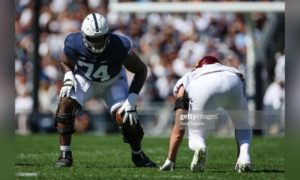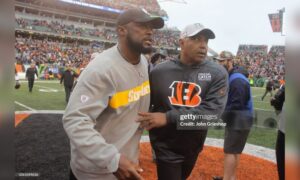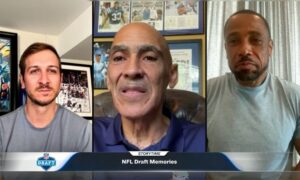Before the Pittsburgh Steelers’ most recent game against the Tampa Bay Buccaneers on Sunday, head coach Mike Tomlin was interviewed for a previously recorded pre-game segment, during which Fox NFL sideline reporter Laura Okmin asked him about his thoughts on being labelled a “player’s coach”.
While he preceded his statement by saying that the label itself doesn’t bother him, he went on to say that it has grown tiresome over the course of his eight years on the job to be bombarded with the same question, suggesting that the label “invariably means something about my race and my age”.
By way of comparison, Tomlin pointed to his own defensive coordinator, the Caucasian, 77-year-old Dick LeBeau, who is referred to as “Coach Dad” by his players. The head coach said that LeBeau is a player’s coach, but he doesn’t get asked about the label nearly as frequently as he does.
As a matter of fact, Tomlin was asked about being a player’s coach only a few days prior when he was interviewed on the NFL Network, during which he discussed the importance of the relationships that he builds with his players as a part of his job.
During the Fox interview, Okmin pointed to Pete Caroll as another head coach regarded as a “player’s coach”, and how she saw nothing wrong with the label. But it makes me wonder how frequently Caroll is asked the same question, which seems to come up every time the Steelers play a primetime game, or any time Tomlin gives an interview outside of the Pittsburgh area.
The truth of the matter is that Tomlin’s age and race did absolutely play a role in helping him establish some type of relationship with his players when he first came on the job as Steelers head coach in 2007.
There are players on the team now who are currently older than Tomlin was when he took the job. He even played against James Farrior in college. And it’s no secret that a significant majority of the league is ethnically African-American.
Yet African-American coaches have been scarce, and their performance has been scattershot at best. He became only the second African-American coach to win a Super Bowl, just two years after Tony Dungy became the first to do it during the 2006 season.
There has been a fair amount of backlash for Tomlin in response to his comments during that Sunday airing of the interview. Even Pittsburgh Post-Gazette beat writer Ed Bouchette spoke to Pro Football Talk, saying that “that is the first I’ve ever heard of” Tomlin taking issue with being given the “player’s coach” label, in essence suggesting he could not understand the coach’s reaction.
But it’s really quite simple. First, it’s important to point out that Tomlin never intimated in any way that being given the label of player’s coach—which he certainly is, corroborated by anonymous player polls—is racist in any way. Rather, he merely claimed that he believes his race plays a role in his being so frequently asked about being a player’s coach.
Tomlin is not, and has not over the past decade, been the only coach that has been popular among his and other players around the league. Yet nobody seems to be so frequently in the limelight for that specific purpose than he has throughout his tenure.
And I don’t suspect that it’s a coincidence he just so happens to be the only current African-American head coach to achieve a significant measure of success, though Marvin Lewis and Lovie Smith have had their spots.
But Smith was 42 when he became a head coach in 2004. Lewis turned 41 in 2003 in his first season as head coach.
Tomlin was just 34, and became the youngest head coach to ever win the Super Bowl in his second season. He instantly became the player’s coach because he was young, black, and cool, and it was pointed out at every turn.
While that in itself may grow tiresome, so too do the underlying implications of the unending repetition of the question over the course of the past decade. Tomlin spoke yesterday about the topic, saying that he was in no way insulted by the term itself, but that he is bothered by lazy stereotypes.
And he has every right to be, because the incessant focus on Tomlin as the best friend of his players overshadows and diminishes his actual responsibilities as a head coach. It calls into question his professionalism and his ability to be a disciplinarian.
It also suggests that his relatability to his players—based on race, age, and behavior—allow him to get more out of his team than anything he could do in the role of head coach. And that is the crux of the matter.
The label of player’s coach, for Tomlin specifically, has over the years indeed become a label and stereotype, and has overshadowed his accomplishments in his profession. Anybody would object to that. And considering it’s come up for the first time in eight years, I hardly see what he had to say as unreasonable.







